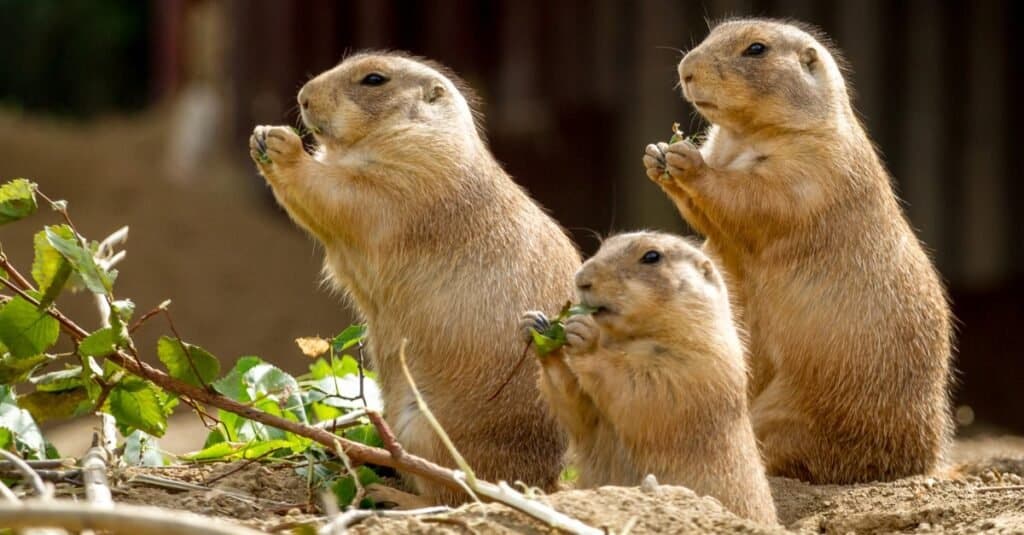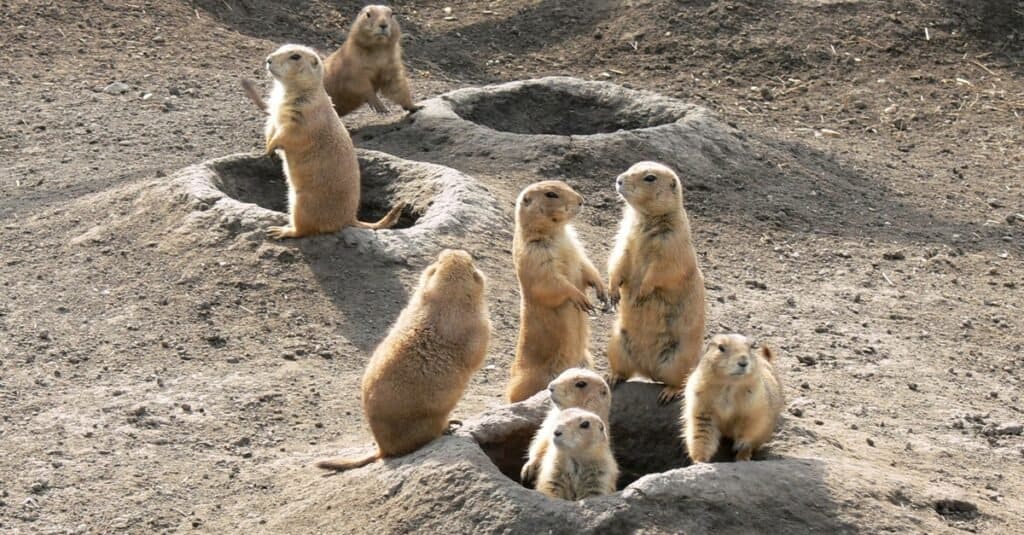Beavers are famous for being hardworking, but prairie dogs might give those busy beavers a run for their money. These little guys build entire underground homes where hundreds of them find shelter.
Fun Facts About Their Homes
Prairie dogs live in large underground burrows which have a complex tunnel and warren system. They have specific areas for their young, sleeping, and even a spot for their waste. Some prairie dogs will even have listening posts near exists. These tunnels are created to allow air flow through them providing proper ventilations.
Additionally, here are prairie dog home facts:
- They live in highly complex colonies with underground burrows guarded by sentries.
- Their preferred habitat is short scrub grassland.
- They are “keystone species,” which means their presence is critical to an entire ecosystem.
- They greet each other by showing their teeth.
- Their babies are called pups.
What is a Prairie Dog?
Despite its name, it is not a dog. It is a burrowing rodent endemic to the western part of the U.S.
These burrowers are native to Texas, Wyoming, South Dakota, Montana, and other western and central states.
These rodents are known for their charming cuteness, extensive underground colonies, and the loud bark that gives them their name.
There are five species of prairie dog: black-tailed, white-tailed, Utah, Gunnison’s, and Mexican.
Prairie dogs are a keystone species. According to the Oxford Dictionary of Zoology, a keystone species “has a disproportionately strong influence within a particular ecosystem, such that its removal results in destabilization of the ecosystem and can lead to further species losses.”

©Marie Dirgova/Shutterstock.com
Where Do Prairie Dogs Live?
Prairie dogs live in mixed and short grassland areas that are big enough to hold their extensive colonies.
Home Sweet Home
Prairie dogs are highly social critters, and they build large colonies known as “prairie dog towns.” Each town has a series of connected, underground burrows they use to visit each other and hide from predators.
The town is highly complex. Each is divided into wards and then subdivided into smaller wards called “coteries.” The word coterie is a French word that means a clique or club.
Members Only
In prairie dog towns, a coterie comprises a male, up to four females, and prairie dog babies up to two years old. Some coteries may have 10 offspring or more.
Each burrow is guarded by a “sentry” prairie dog that barks to warn the others of approaching danger. When the sentry barks, the other prairie dogs dive into their burrow and wait for the “all clear” bark.

©Zoltan Tarlacz/Shutterstock.com
Where To See Wild Prairie Dogs
Prairie Dog Town: This preserve in Lubbock, Texas, was the first prairie dog preserve in the world. Kennedy Clapp and his wife lived in Lubbock in 1931. The government had recently conducted atomic tests near Lubbock, and the Clapps worried that the testing might harm colonies of black-tailed prairie dogs (Cynomys ludovicianus). They established Prairie Dog Town with four dogs and two burrows in a local park.
In 1935, it became part of the state park system and moved to Mackenzie Park. Since then, Prairie Dog Town has become one of Lubbock’s top attractions. It is also a refuge for burrowing owls who share the burrows with prairie dogs. In 2004, local businesses gave it a major renovation with improved parking, a viewing area, and ADA accessibility.
Arapaho National Wildlife Refuge: This national park in Colorado is home to many birds, waterfowl, and mammals, including a prairie dog town of white-tailed prairie dogs.
Valles Caldera National Preserve: This reserve in New Mexico is home to a wide variety of wildlife. Among its residents are many Gunnison’s prairie dogs.
Prairie Dogs in Zoos
Some zoos have created safe colonies where prairie dogs can dig and burrow to their heart’s content. These playful, busy rodents are always a popular attraction for visitors.
You can check out these cute critters at Southwick’s Zoo in Mendon, Massachusetts.
The Maryland Zoo in Baltimore has its own Prairie Dog Town full of black-tailed prairie dogs. In spring 2021, the zoo celebrated the births of several new pups.
The Saint Louis Zoo has a prairie dog town of black-tailed prairie dogs. So does the Bergen County Zoo in New Jersey.
Are They Endangered?
The black-tailed, white-tailed and Gunnison’s prairie dogs are “of least concern” for conservation status. Despite this status, conservationists stress that it’s critical to maintain healthy prairie dog populations. They stress the facts that their numbers have diminished and threats to their populations remain.
The Utah prairie dog and the Mexican prairie dog are endangered.
Next Up…
- Prairie Dog Vs Groundhog – Click here to learn the differences between these two very interesting creatures!
- 10 Incredible Prairie Dog Facts – Prairie dogs call huge complex underground burrows their home, but what other cool facts are there about prairie dogs? Keep reading to find out!
- What Do Prairie Dogs Eat? – Crunchy bugs or plants? Click here to find out what’s on the menu for prairie dogs!
The photo featured at the top of this post is © Images by Dr. Alan Lipkin/Shutterstock.com
FAQs (Frequently Asked Questions)
What is a prairie dog’s home called?
It’s called a prairie dog town. Inside the town, each coterie or family protects an area roughly one acre in size.
Are prairie dogs aggressive to humans?
Like other rodents, they are very smart and playful. They are not aggressive to humans because they’re afraid of us. Like their squirrel cousins, they get used to living among humans, but they are not pets. You should enjoy them from a distance.
How many prairie dogs live in each town?
A town can have hundreds or even thousands of residents. Each coterie includes several females and all the young pups. Once the pups are two years old, they leave the coterie and form their own family. The largest recorded town was 100 miles by 250 miles and housed 400 million prairie dogs.
Are prairie dogs the same as groundhogs?
No, they are not. Groundhogs are also rodents, but they are much larger than prairie dogs and do not build complex colonies. Groundhogs are solitary, and prairie dogs are highly social.
Are they the same as gophers?
Gophers are also rodents, and they also burrow, but they are not the same animal. Prairie dogs are about the size of rabbits, and gophers are about the size of squirrels.
There are also differences in how each one uses its habitat. Gophers spend most of their time underground, and prairie dogs prefer to spend their time above ground. They only go into their burrows to hide from predators and other threats.
Thank you for reading! Have some feedback for us? Contact the AZ Animals editorial team.






